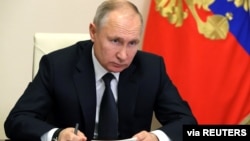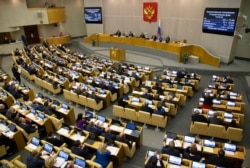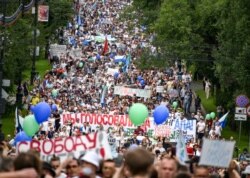This year marks the 30th anniversary of the dissolution of the Soviet Union. The December collapse was jolting in its speed and followed a failed coup by hard-liners against then-Soviet leader Mikhail Gorbachev.
Many Russians will celebrate the anniversary privately, although no formal ones are planned by state authorities. For Russian President Vladimir Putin, the dissolution of the Soviet Union was “the greatest geopolitical tragedy of the 20th century.”
But it is an event also preoccupying the Kremlin today, analysts and Western diplomats say, a haunting historical example of how quickly an authoritarian state can unravel. They say a lesson being drawn inside the Kremlin is to double-down on using state power to maintain control.
Bracing for challenge
They point to the poisoning of Russian opposition activist Alexei Navalny last year as a sharp escalation in a Kremlin campaign seemingly aimed at squashing dissent and silencing alternative political voices.
Speaking at an online event hosted last month by the Washington-based Center for Strategic and International Studies, Russian pollster Denis Volkov said the Kremlin is aiming to “demobilize the critics, to make them passive, to make them inactive.”
Last year, Putin changed Russia’s constitution, paving the way for him to remain in power potentially until 2036. The amendment was backed in a referendum by 79% of Russians who cast a vote, although there were also allegations of irregularities, including voter coercion and multiple voting.
But that does not appear to have reassured the Kremlin or made it any more confident about the future. Navalny's poisoning suggests the Kremlin remains on edge and nervous about future challenges to its authority.
FILE - Russian lawmakers vote on a third reading of constitutional amendments at the State Duma, the Lower House of the Russian Parliament in Moscow, Russia, March 11, 2020.
According to Andrei Kolesnikov, an analyst at the Carnegie Moscow Center, the Kremlin is facing a growing number of problems and is trying to prepare for all possible scenarios. Unrest in neighboring Belarus, which has been rocked since August by mass protests against the rule of President Alexander Lukashenko, as well as disturbances in Kyrgyzstan, is heightening Kremlin alarm.
“The only goal of Putin and Putin’s elite is to keep themselves in power,” Kolesnikov said.
The analysts say numerous recent pieces of legislation emphasize the Kremlin’s apparent determination to continue to increase efforts against Putin’s domestic opponents ahead of what is likely to be a big political year in Russia, with parliamentary elections scheduled for September.
They say the Kremlin senses the political winds are shifting against the government, which goes some way in explaining the timing of the attempted assassination of Navalny and measures strengthening state power.
Navalny fell ill in August 2020 on a flight home from Siberia to Moscow. The pilot diverted the plane so Navalny could receive life-saving treatment. The political activist is recuperating in Berlin, where he was treated. Tests in Berlin indicated the presence of the nerve agent Novichok in his body.
Western governments say Navalny was poisoned with the Soviet-era nerve agent, the same toxin that British officials say was used to poison former Russian spy Sergei Skripal in England in 2018. The European Union has sanctioned FSB (Russian intelligence service) chief Alexander Bortnikov and senior Kremlin officials over the attack.
The Kremlin has denied any role in the poisoning.
In December, Putin neither confirmed nor denied the involvement of Russian agents in the assassination attempt of Skripal but joked that if they had wanted him dead “they would have probably finished it.” But the Russian leader did not dispute that Navalny had been tailed for years by FSB agents.
New legislation
Last week, Putin signed a measure updating the so-called foreign agent law, which was first passed in 2012 and initially targeted foreign media outlets and civil society groups that receive any funds from outside Russia.
The law was subsequently broadened to include individual journalists and bloggers, requiring them, like foreign-media outlets and foreign-funded civil rights groups, to report their activities and submit to frequent financial audits. The law has already led to the closure of some major non-governmental organizations in Russia.
The amendment signed by Putin Wednesday further expands the parameters under which a person or entity can be deemed a “foreign agent." Before, they had to receive foreign funding. Now, they can be labeled a foreign agent if state authorities consider their activities to be “in the interests of a foreign power.”
Amnesty International said the new measure signals the start of a “a new witch hunt” in Russia.
“It exposes the Russian authorities’ belief that civil society actors are destructive "agents of the West" bent on destabilizing the government,” Amnesty International researcher Natalia Prilutskaya said. “The Russian authorities have already starved civil society financially and forced many organizations to close. Now, they are further demonizing individual activists.”
New restrictions have also been imposed on public protests, and the government has given itself enhanced authority to block foreign and domestic websites it says are censoring Russian state-media content.
Rising discontent
The economic repercussions of the coronavirus pandemic, which is adding to growing inequality and poverty, is likely to fuel public frustration. It comes amid signs that Putin’s hitherto majority support is not something the Kremlin can take for granted, said pollster Volkov.
Russian officials appear to have been surprised by anti-Kremlin protests last year in Khabarovsk in Russia’s far east, where locals reacted furiously to the arrest on criminal charges of the region’s popular governor and political outsider, Sergei Furgal. In a national poll conducted last year, the Levada Center said 47% of respondents said they had a positive view of the Khabarovsk protests. Putin’s approval ratings have also been slipping.
Putin recently spoke about the final years of the Soviet era.
“The Soviet Union had everything, but there was not enough for everyone," he said. “Back then, the problem was due to a shortage. But now, it could be because people do not have enough money to buy certain products at the prices we see on the market.”







